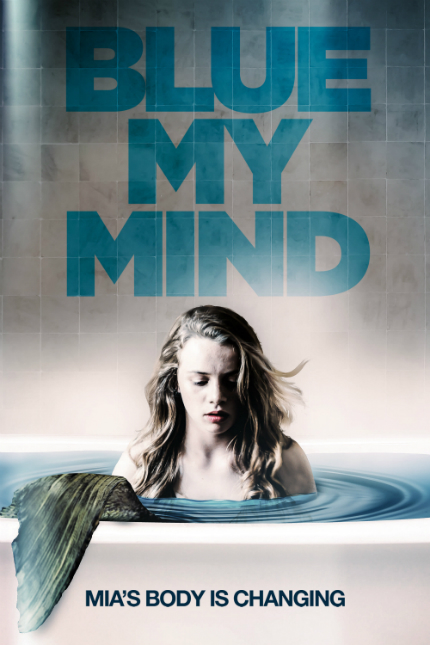Review: BLUE MY MIND Confidently Portrays Adolescence in a Subversive Fairy Tale
Lisa Brühlmann's debut film is a full-bodied portrayal of adolescence and its fearful insecurities.

There’s something about first-time filmmakers turning to the coming-of-age genre that feels oddly appropriate. Ostensibly at least, it’s a perfect experiential match between creator and creation insofar as both cineaste and protagonist are debuting into the world after a journey filled with firsts.
But whatever jitters Swiss writer-director Lisa Brühlmann may have had realizing her graduation project, it doesn’t show on screen. To the contrary, in terms of craft and overall execution Blue My Mind expertly differentiates itself from its subject matter, resulting in a confident, full-bodied portrayal of adolescence and its fearful insecurities.
The story centers on Mia (Luna Wedler), a sensitive teen who’s been uprooted and forced to adapt to a new school midway through the year on account of her father’s career change. Not content to just ogle the cool clique from afar, she’s eager to win their favor and desperate for approval from peers who act twice her age. Heedless of consequence, Gianna (Zoë Pastelle Holthuizen) and her gal pals embrace all manner of extreme behavior. In the face of choking games, pill-popping and binge drinking, their smoking habits, shoplifting and twerking are tame by comparison.
Mia too gets a rush from these and other forms of rebellion. Like most teens, she acts out against her parents, is keen on experimenting, and very curious about sexual exploration, all the more so because losing her virginity is sure to up her cool factor with the libidinous teenagers she looks up to. What at first resembles ‘a good girl gone bad’-narrative (with a cautionary spin on the dangers of acclimating too carelessly writ large on the horizon) becomes a subversive fairy tale emboldened by body horror.
Adolescence can be fraught with terror because the body you once knew no longer feels like your own. ‘Shapeshifting’ almost naturally assumes symbolic qualities in the context of teen narratives and, in part, Mia’s metamorphosis in Blue My Mind resembles films like Ginger Snaps and, to a lesser extent, Thelma, for framing the pangs of puberty through a fantastical lens.
Thematically, the trajectory of Brühlmann’s film is in line with that of Raw and Der Nachtmahr. Like the former, it implicitly criticizes the perverse ways in which our society allows the sexual maturation of young women to go hand in hand with instant objectification. There’s a streak of casual sexism to the manner in which all of Blue My Mind’s young males only seem to acknowledge their classmates as potential partners they can ‘get with’. Likewise, to the in-crowd of female characters at the film’s center, having had sex is a measure of self-worth in a climate that all too easily promotes an internalization of negative self-images and eventual self-loathing.
As is the case in both Ducournau’s and Akiz’s debuts, the alterity Mia comes to exhibit by way of her transformation is a symbol of nonconformity and source of unique power. In a film that is a journey towards gradual (often begrudging) self-acceptance, the process of coming into her own is also what saves her from being raped. Only after her appearance has altered to the extent that she’s no longer deemed attractive by western beauty standards is she free from the male gaze. More than a poignant portrayal of female puberty, Blue My Mind is an allegory for escaping the stifling constraints society places on young women in the form of mental shackles.
Blue My Mind doesn’t sugarcoat explicit scenes yet also comes with an overall arthouse sensibility that brings to mind the poetic tranquility of Jonas Alexander Arnby’s When Animals Dream. The film overflows with elegantly composed shots, the most striking of which are simply of Mia getting in touch with her true self as she drinks in the sounds of her environment.
While Brühlmann possesses a keen feel for narrative rhythm, an absence of committed performances could have turned Blue My Mind into a drag. Fortunately, Wedler and Holthuizen are the type of leads who command the screen from start to finish and further infuse the film with effortless authenticity; a highly accomplished debut by everyone involved.
For a deeper dive into all things Blue My Mind, be sure to check out Martin Kudlac’s interview with Brühlmann herself, although you might want to seek out the film first.
Review originally published during International Film Festival Rotterdam in February 2018. The film will open in select U.S. theaters on Friday, November 2.







